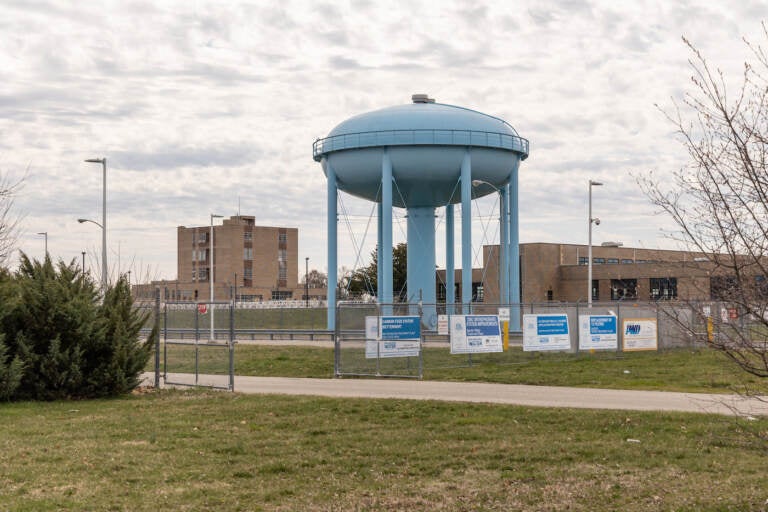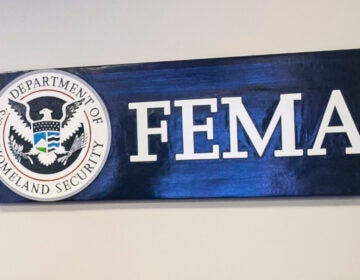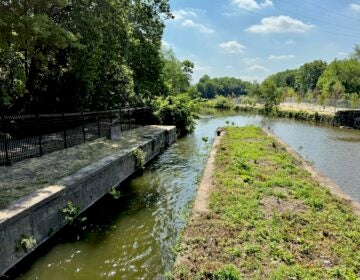Philadelphia water rates increase by more than 9% this week
The proposed rate increase, which went into effect Monday, will help fund the city’s 25-year, multibillion-dollar Water Revitalization Plan.

The Samuel S. Baxter Water Treatment Plant on State Road in Philadelphia, Pa. (Kimberly Paynter/WHYY)
From Philly and the Pa. suburbs to South Jersey and Delaware, what would you like WHYY News to cover? Let us know!
Philadelphia residents will get hit with higher water bills starting this week.
The Philadelphia Water Department has raised water rates by 9.4%, meaning the average household can expect to pay around $89.42 per bill — about an $8 increase.
The water department said the rate increase, approved by the Philadelphia Water, Sewer and Storm Water Rate Board, is driven by rising labor and equipment costs, as well as new federal regulations requiring water providers to take steps to improve surface and drinking water quality.
The proposed rate increase would also help fund the city’s 25-year, multibillion-dollar Water Revitalization Plan, which aims to prevent system failures.
Without a rate increase, the water department said it would be forced to cut back on essential services, including for its wastewater and stormwater collection systems.
“Investments in our … water mains in the roadways help to reduce the number of water main breaks on a citywide level, improve our level of service and ensure we’re able to provide drinking water and wastewater service to customers,” said Ben Jewell, acting commissioner for the Philadelphia Water Department.
Next year, water bills in Philadelphia will increase another 5.5%.
The U.S. Environmental Protection Agency is requiring water providers to invest in technology to remove what’s known as “forever chemicals,” or PFAS, from drinking water in the next few years, and to remove lead pipes over the next decade. Water providers have also been tasked with upgrading their wastewater infrastructure to reduce stormwater and sewage overflow, and to eliminate discharges of ammonia into waterways.
“Unfortunately, in this day and age, the cost to operate that utility is getting higher and higher,” said Rob Ballenger, an attorney at Philadelphia Community Legal Services, which advocates for affordable utility rates. “At the same time, there aren’t federal and state resources being made available to help offset the need for the utilities to raise rates, to reinvest in [the infrastructure] that allow us to have safe and efficient water service in our homes … and, for the most part, that cost is being borne by the customers.”
Though the federal government under the Biden administration set aside billions of dollars to upgrade water and sewer infrastructure, and many water departments have access to low interest state loans, providers say more funding is needed.
Jewell said a significant amount of investment is needed to improve infrastructure in Philadelphia.
“The infrastructure, which was developed with huge infusions of federal money, is aging and it requires investment to renew, rehabilitate and ensure the long term function of it,” he said. “A financial commitment from the federal government would go a long way to helping all utilities control the costs associated with those improvements and continue to deliver services to our customers.”
The increased water rates will also help the department invest in a fund that is intended to provide relief during hard financial times, such as during the COVID-19 pandemic. Since the pandemic, that fund has whittled down.
The new rates are a significant reduction from the water department’s original request for an increase of more than 16% over the next two years.
The water department offers a number of programs to help residents who are struggling to pay their bills, including the Tiered Assistance Program, which allows people to pay their water bills based on their incomes.
The water department now automatically enrolls residents in assistance programs when they qualify, which has increased participation from fewer than 20,000 ratepayers in the tiered assistant program in 2022 to more than 60,000 ratepayers today.
Residents struggling to pay their water bill should call 215-685-6300 to request a customer assistance application, or apply online.
“If you’re behind on your bill or you can’t afford your bill and you apply, the city has the obligation to figure out what the best and most affordable bill is,” Ballenger said.

Get daily updates from WHYY News!
WHYY is your source for fact-based, in-depth journalism and information. As a nonprofit organization, we rely on financial support from readers like you. Please give today.






